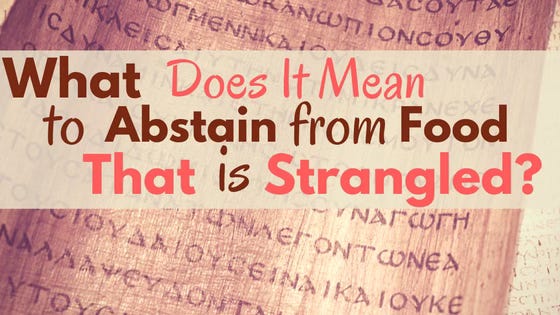What Does It Mean to Abstain from Food that Is Strangled?
Sorting through views of various commentators on this taboo topic
Recently we shared 3 Overlooked Dietary Laws in the New Testament. The Council of Jerusalem meted out several dietary restrictions that are little discussed today. These restrictions can be found in Acts 15:20 and repeated in Acts 15:29 and 21:25:
New converts were to abstain from eating food contaminated by idols (the Apostle Paul teaches more about this issue in 1 Corinthians 8-10)
They were to not eat meat that was killed by strangulation or smothering (it was to be killed by bleeding out)
They were to abstain from eating blood
In a previous post, I dealt with food sacrificed to idols: What Does It Mean To Abstain From Food Sacrificed to Idols?
Now, we will discuss the topic of abstaining from food that is strangled. There is some controversy surrounding this issue. Many commentators say that these dietary laws have passed away along with the Old Testament dietary laws. These laws, they say, were instituted for a period of time in the early church to avoid causing Jews to stumble. They draw upon Paul's treatment of food sacrificed to idols in I Corinthians 8-10 to form this conclusion.
[FTC disclosure: As an Amazon Affiliate, I may earn a small commission if you order something after clicking a link. Thanks for supporting my work.]
When discussing strangled meat, Elliott's Commentary for English Readers says these dietary laws have no moral value, and "the prohibition has simply the character of a concordat to avoid offence [sic]." And Matthew Henry agrees:
They were counselled to abstain from things strangled, and from eating blood; this was forbidden by the law of Moses, and also here, from reverence to the blood of the sacrifices, which being then still offered, it would needlessly grieve the Jewish converts, and further prejudice the unconverted Jews. But as the reason has long ceased, we are left free in this, as in the like matters.
Elliott and others, however, struggle when they attempt to rectify this view with a 4th law given at the Council of Jerusalem. This 4th law states that the new converts were to abstain from fornication. This law, they agree, is moral. And they are conflicted as to why it would appear next to dietary laws, which in their estimation have no moral value.
Elliott writes:
We are surprised at first to find, what seems to us, a moral law placed in juxtaposition with two rules which, like those that follow, seem purely positive and ceremonial.
Barnes' Notes on the Bible says of fornication:
The word used here πορνεία porneia is applicable to "all illicit sexual intercourse," and may refer to adultery, incest, or licentiousness in any form. There has been much diversity of opinion in regard to this expression. Interpreters have been greatly perplexed to understand why this violation of the moral law has been introduced amidst the violations of the ceremonial law, and the question is naturally asked whether this was a sin about which there could be any debate between the Jewish and Gentile converts?
These commentators are rightly perplexed. Why would God allow the Church to make a (so-called) ceremonial decree that Gentile converts were forbidden to eat strangled food along side a decree against fornication — particularly if one law was merely to placate the Jews and the other had a moral nature?
There are several questions that need to be asked to help understand this controversial issue.
First, was the ceremonial law the source of the command to abstain from eating food strangled?
Could the case be made that eating strangled food is not merely a ceremonial issue, but rather it is binding today because it was instituted by God before the ceremonial law was issued?
Could this instruction to abstain from strangled food be a reiteration of an older law which is binding on all men?
Was the Council at Jerusalem merely trying to placate the Jews?
How did the early church respond to this and other dietary restrictions?
Was the instruction to abstain from strangled meat placed in tandem to a clearly moral law because the law itself has moral ramifications?
Is it possible that the modern Christian church has wrongfully neglected this clear New Testament teaching?
If so, are there ramifications in the body of Christ for ignoring this decree?
Could it be that the church should be teaching its members to abstain from food that has been strangled?
Since this is a lenghty topic, I will take a series of articles to address these questions and more.
Future posts will begin delve into the above questions; look at the Old Testament passages for wisdom; see what other commentators have said; look at the Jewish practice of slaughtering animals; explore modern slaughtering techniques; address the health concerns surrounding strangled food; and cover other pertinent issues surrounding this important topic.
Read the next installment in this series: 3 Reasons This Dietary Law May Be Moral, Not Ceremonial.
Are you enjoying this series?

